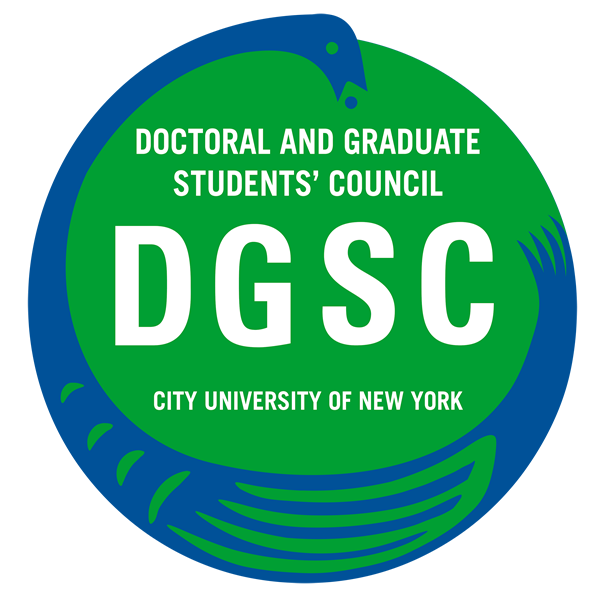Student Elections in Programs
The Doctoral and Graduate Students’ Council has prepared the following resources for students conducting elections in their programs. While the DGSC is not responsible for program elections, it is in all students’ interests to have representation on their program’s committees. To this end, these resources are intended to ensure that elections occur in a fair, democratic, and accountable way.
If required, the Co-Chair for Student Affairs, the CCSA (ccsa@cunydgsc.org) can help students conduct program elections.
Background
GC Governance requires that each program have the following standing committees (§3.5-3.6):
- Executive Committee, which operates the program between standing meetings of the faculty, makes recommendations to Graduate Council, reviews faculty resources, and evaluates policies and procedures on dissertations.
- Faculty Membership Committee, which nominates members of the program’s faculty, maintains a roster of potential doctoral faculty, records the status of faculty members currently designated, and reviews all actions take regarding faculty membership.
- Curriculum and Examinations Committee, which reviews curriculum and examination procedures and makes recommendations for action.
- Admission and Awards, which recommends admission and awards procedures and standards for the program and administers these procedures in accordance with these standards.
- Elections, which conducts all program elections.
In addition, a program’s faculty, its governance structure, or its Executive Committee may establish additional standing committees.
To check whether additional standing committees are described in your program’s governance document, contact dgsc@cunydgsc.org.
Each of these committees must have student representation elected by students in the program (§6.4B). If there are no students on your Elections Committee or your program does not have such a committee, discuss the situation with other students in your program and elect three students to moderate elections. Inform your EO and APO of their names, and refer to sections of the GC Governance as necessary.
For further advice or if any of these committees do not exist in your program, contact dgsc@cunydgsc.org.
In addition to committees, students also elect representatives to
- Graduate Council, the governing body of the Graduate School
From the Graduate Council Bylaws:
Each program has one student representative per 100 matriculated students, or part thereof (§2.1A). Graduate Council representatives are elected for a two-year term, expiring in even years (§2.1.E) For a current headcount of the students in your program, contact the Co-Chair for Business at ccb@cunydgsc.org
DGSC Program Representatives are elected through a separate process administered by the DGSC. See Elections for more information.
The DGSC uses eBallot by Votenet Solutions, Inc. to conduct all DGSC elections.
Managing Elections
Elections can be managed through a three-step process. First, moderators can solicit nominations for each committee position through Google forms/an equivalent survey platform. Second, nominees should be contacted to confirm nomination acceptance. Third, a survey ballot can be prepared with the names of nominees as multiple-choice responses. The CCSA can create this final election ballot on eBallot, if required.
What You’ll Need
Here’s what you’ll need to get started:
- A list of committees and open positions. This can usually be obtained from your EO or APO. At minimum, it should contain the five committees listed above. Ask for descriptions of additional committees so that students know what they’re nominating for and voting on.
- A list of all student email addresses. If your APO doesn’t already have one, request addresses through your program’s listserv, or use this as an opportunity to compile one.
Step 1: Nominations
- Solicit nominations for each committee from the program student body using Google Forms/an equivalent survey platform.
Step 2: Contacting Nominees
- After closing nominations, you’ll need to contact nominees by email to confirm acceptance of their nomination.
- Here’s some sample text for nomination confirmations:
"Dear NOMINEE,
I am pleased to inform you that you have been nominated to serve on the *insert committee name here* committee. Do you accept this nomination?
If you have any questions regarding the position, please feel free to contact *insert contact for election committee here*.
Again, congratulations on your nomination and we look forward to seeing you in the future. Please respond to your nomination by *insert date here* so that we may process ballots for the elections in a timely manner."
Step 3: Voting
- Once you have the final list of confirmed nominees, you may create an anonymous election ballot on Google Forms/an equivalent survey platform.
- You can also ask the Co-Chair for Student Affairs (CCSA) to create the election ballot on eBallot. Please include a document with the following information in your email to the CCSA:
- The list of committees with brief descriptions of each committee, final nominees to each committee, and number of open positions for each committee (positions and alternates).
Recommended Timetable
- March 1–15, Solicit nominations for positions.
- March 15–20, Confirm nominations.
- March 21–31, Conduct voting.
- Before April 15, Report elections results to your EO, APO, Executive Committee, and students in your program.

